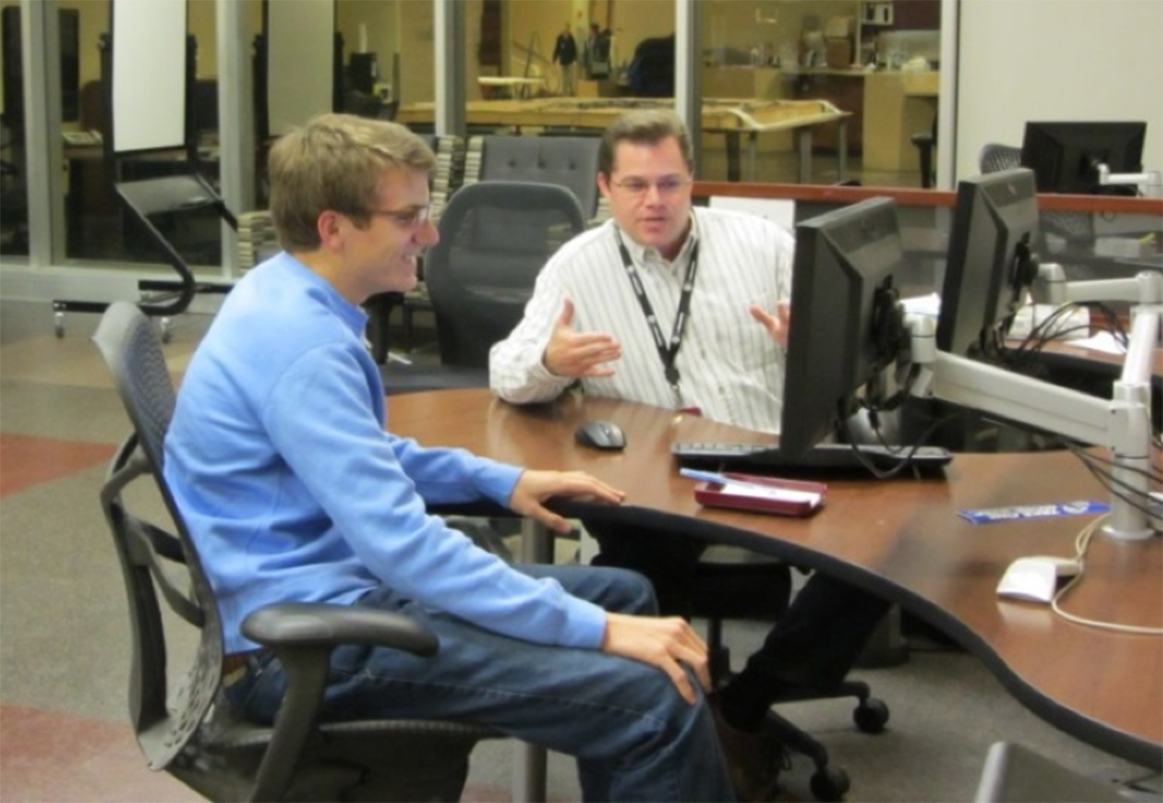
Chad Pearson (Brittain Fellow 2007-2008) works with a library patron at Texas A & M. Photo by Tiana Faultry-Okonkwo.
In a previous article, I described practical but also subjective reasons I switched from the traditional professor route to the library field. I also pointed out facts and figures related to job placement rates for tenure-track positions and alternatives to academic careers. I don’t quite fit the mold of leaving academia, as I am now employed at a major research institution, nor do I offer my journey as a prescription for others, but I do hope those reading my words may realize there are plenty of other ways to use your academic talents if the professoriate does not enchant you as a long-term career.
In this article, I want to describe some of my reasons for choosing the library field as my career. There are a variety of libraries with different types of librarians (corporate, legal, medical, school, archival, etc.), and academic librarianship and reference is just one particular subset of the profession. I hope you find some inspiration from my musings, especially if you are considering alternative career options.
Reason 1: Librarians function as faculty
As an academic librarian, you engage in many similar duties to a professor. In some institutions, librarians have faculty status, in addition to tenure-track options. You also can teach students in your liaison field through information searching instruction sessions and provide reference consultations (extended research questions) that allow you to feel the joy of teaching better research skills, investigating topics, and helping young minds get excited about discovery. You can also order books for your chosen liaison area and discuss details of professors’ classes with them, maintain relationships with faculty, and keep abreast of new research trends in your subject area. You can also become a generalist librarian and not align yourself with one set liaison area.
Also, here are some other practical factors to consider: You are hired as 12-month faculty versus 9-month; you usually get paid the same (or better) as a tenure-track faculty member at many institutions; the pressure to publish is present if you are a tenure-track librarian but the publication requirement is usually far less than for full-time teaching faculty; you still get to serve on committees and even university-wide committees, similar to full-time faculty; and you can even teach a credit course (such as a library skills class) or if you have the proper credentials a course for one of your liaison departments, although that would not usually be considered part of your job requirements.
Reason 2: Librarians encourage interdisciplinary thinking
Libraries offer you the chance to learn about many different knowledge areas. While it is true you can serve as a subject liaison to majors you have some familiarity with due to your own educational background, you also need to be able to handle inquiries that can range across the sciences, social sciences, and humanities. Librarianship in terms of reference duties is a true interdisciplinary field, although you are still allowed to collect books, meet with faculty, and teach students in your discipline areas. I did not want to just dabble in one knowledge discipline the rest of my career, but to engage knowledge in a truly interdisciplinary way.
Reason 3: Librarians develop one-on-one relationships with patrons
Some of my favorite moments as a potential professor were discussing complex topics one-on-one with students, actually seeing how their brains think and interpret information without the intimidating environment of the classroom. I found myself enjoying my role as a supposed fount of knowledge and appreciating the enthusiasm of youthful receptivity to ideas. As a librarian, I have had many fulfilling personal consultations with students, from the undergraduate to graduate level. While I initially had anxiety about approaching topics I knew nothing about, it forced me to expand my knowledge base and see the wondrous connections among so many concepts.
Reason 4: The future is bright for libraries
While job placement rates in the academic library field could use a boost, there are still plenty of jobs and the salary scale is comparable to starting tenure-track assistant professors. I think the library profession will be one of the best suited to handle the monumental technological changes that will be forthcoming in the next 10 years, expanding our roles with virtual reality instruction, avatar assistance, creating taxonomies, holographies, and interactive instructional technologies that will make searching for information far more seamless and interactive.
Dr. Chad Pearson is a Clinical Assistant Professor and Public Services Librarian at Texas A & M University. He was a Marion L. Brittain Postdoctoral Fellow at Georgia Tech from 2007-2008.
